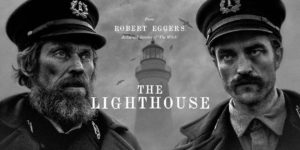Robert Eggers, the writer and director of 2015’s Puritan nightmare The Witch, is back with another historic tale of terror. The Lighthouse set in the 1890’s, is a film about two men on a desolate and distance rock of an island stationed as lighthouse keepers. Willem Defoe plays Thomas Wake, the senior lighthouse keep, a sea dog retired by injury but for whom the love of the sea has never subsided. Robert Patterson plays Ephraim Winslow, the young and junior man learning the trade and subject to Wake’s order and whim.
Filmed in stark black-and-white, it’s been reported that the film stock had to be manufactured in order for the camera to roll on this production, and with a tight compressed aspect ratio The Lighthouse is a confined claustrophobic movie with a stark spare setting contrasted with expansive performances by both Defoe and Patterson the threaten to shatter the frame. The photography is  deliberately disorienting as sea, fog, and land blend in endless greys heightening the sense that the rest of the world as vanished over the horizon and that for these men there is nothing but the grueling work, their own clashes of personality, and the ever encroaching madness. The combination of Egger’s passion for historical detail, the bleak black and white cinematography, along with the ever present fog horn create a verisimilitude that absorbs the audience into the film’s reality.
deliberately disorienting as sea, fog, and land blend in endless greys heightening the sense that the rest of the world as vanished over the horizon and that for these men there is nothing but the grueling work, their own clashes of personality, and the ever encroaching madness. The combination of Egger’s passion for historical detail, the bleak black and white cinematography, along with the ever present fog horn create a verisimilitude that absorbs the audience into the film’s reality.
Hallucinatory and with an unreliable narrator The Lighthouse is not standard mass-market movie making. People who are expecting kills, jump scares, and a spot of violence every ten minutes are sailing for disappointment with this film. Closer in kin to David Lynch or Cronenberg’s Videodrome, The Lighthouse is a tale of madness and isolation that is powered by the stellar performances trapped with its close quarters. Much like Egger’s previous film The Witch this movie is not easily accessible and is likely to spark a sharp divide between its critical reception and general audience reactions. Though not as symbolic as Lynch, Egger’s film requires active interpretation by the audience with scene after scene that depicts the tenuous grasp of sanity and its loss as the isolation breaks each man in his own manner. Personally I was more thrilled with The Witch on my first viewing but now even eight hours later I find the sounds and images of The Lighthouseto be haunting my thoughts and provoking deeper contemplation. It is a film that cannot be fully assessed with a single viewing and mark’s Eggers as a talent of bold cinema that is willing to color well outside of the lines.
